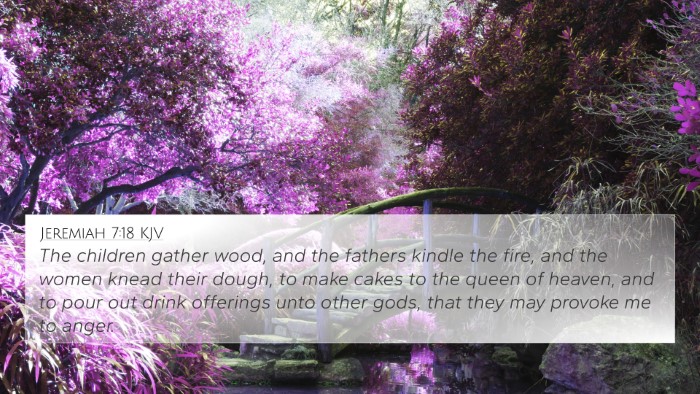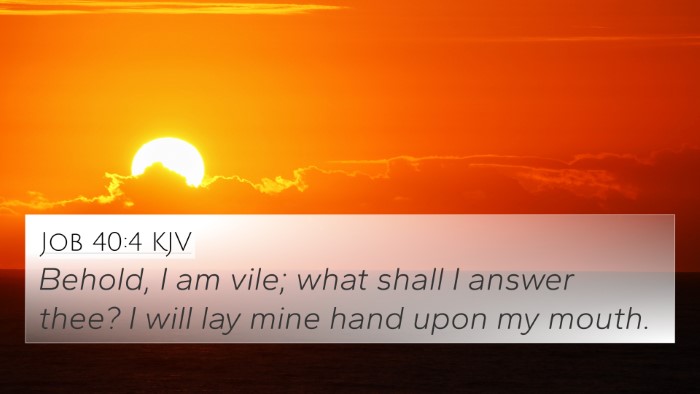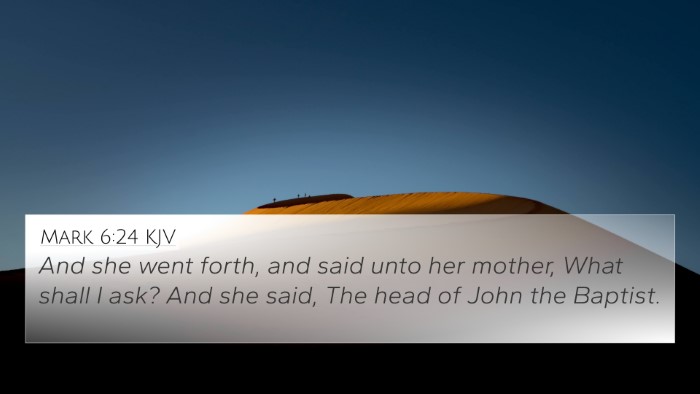Understanding Job 30:8
Job 30:8 states: "They were children of fools; yea, children of base men: they were viler than the earth." This verse is part of Job's lament, where he reflects on his current state compared to the young men who once mocked him.
In this passage, Job draws a stark contrast between his past dignity and his present despair. By examining this verse, we gather insights from various public domain commentaries, enabling us to build a comprehensive understanding.
Commentary Insights
Matthew Henry's Commentary
Matthew Henry comments that in the depths of Job's suffering, he observes the deteriorated moral character of those who now ridicule him. Job perceives that the youth who now deride him are, in fact, lower than he once was, being "children of fools" and "base men." This underscores Job’s sense of justice and moral integrity in contrast to their foolishness.
Albert Barnes' Notes on the Bible
Barnes reflects on the social dynamics at play, noting that Job, once revered, is now cast down to being the object of scorn by those of no standing. He highlights that the character of those who now mock Job reveals their ignorance and moral depravity, emphasizing that they lack the wisdom that should come with age and experience.
Adam Clarke's Commentary
Clarke provides insights into the linguistic aspects of the verse, suggesting that Job’s reference to these mockers as "children of fools" conveys their lack of proper upbringing and moral grounding. Clarke suggests that Job’s lament reflects a deep sense of loss not only for his own status but also for societal values that have seemingly fallen by the wayside.
Deeper Thematic Connections
This verse significantly expresses themes of societal breakdown and the inversion of moral values within human relationships. Job's situation, where he is derided by those he deems inferior, serves to highlight the gravity of his unjust suffering.
Bible Verse Cross-References
- Job 12:5: "He that is ready to slip with his feet is as a lamp despised in the thought of him that is at ease." This verse emphasizes the view of the righteous by the wicked.
- Psalms 22:6: "But I am a worm, and no man; a reproach of men, and despised of the people." Here, the theme of being looked down upon is echoed.
- Psalms 69:12: "They that sit in the gate speak against me; and I was the song of the drunkards." Again highlighting social ridicule against the pious.
- Proverbs 29:27: "An unjust man is an abomination to the just; and he that is upright in the way is abomination to the wicked." Illustrates the separation between the righteous and the wicked.
- Isaiah 53:3: "He is despised and rejected of men; a man of sorrows, and acquainted with grief." This foreshadows Christ’s own rejection.
- Matthew 5:11: "Blessed are ye, when men shall revile you, and persecute you, and shall say all manner of evil against you falsely, for my sake." Followers of God often face ridicule.
- 1 Peter 2:12: "Having your conversation honest among the Gentiles; that, whereas they speak against you as evildoers, they may by your good works, which they shall behold, glorify God in the day of visitation." Emphasizes the contrast between the righteous and the unjust.
Thematic Bible Verse Connections
Job 30:8 can be better understood by linking it to the overarching themes present throughout Scripture regarding suffering, injustice, and the nature of human relationships.
Exploring Job's Context
This verse captures the essence of Job's existential crisis. To Job, the children of fools represent a generation that trivializes wisdom and righteousness, a theme that resonates through many biblical narratives.
Inter-Biblical Dialogue
Job’s reflections invite readers to engage in a dialogue connecting personal suffering with broader societal morals. The prophets often lament over similar themes, confronting the folly of a society that has turned away from God.
Lessons for Today
In a modern context, the themes in Job 30:8 can serve as a reminder of the importance of upholding moral integrity in the face of societal scorn. It challenges believers to remain steadfast in their values regardless of external opinions.
Tools for Further Study
For those interested in deeper exploration of such themes, employing Bible cross-reference guides can illuminate relationships between different texts, enhancing comprehension.
Conclusion
Job 30:8 serves as a poignant reminder of the struggle between the righteous and the wicked, how societal perceptions can shift, and the importance of maintaining one's integrity despite being mocked. Through careful cross-referencing of Scripture, believers can find support and encouragement in their own trials.














